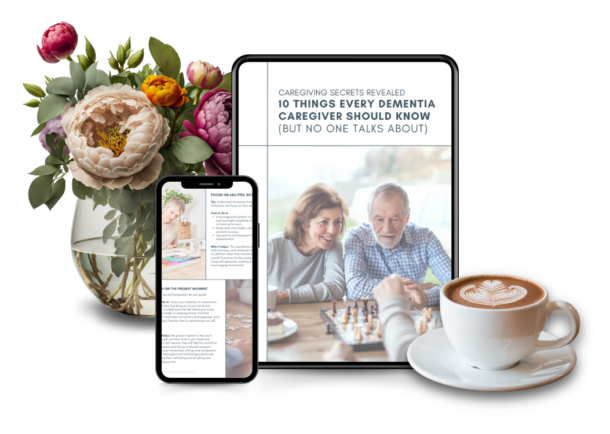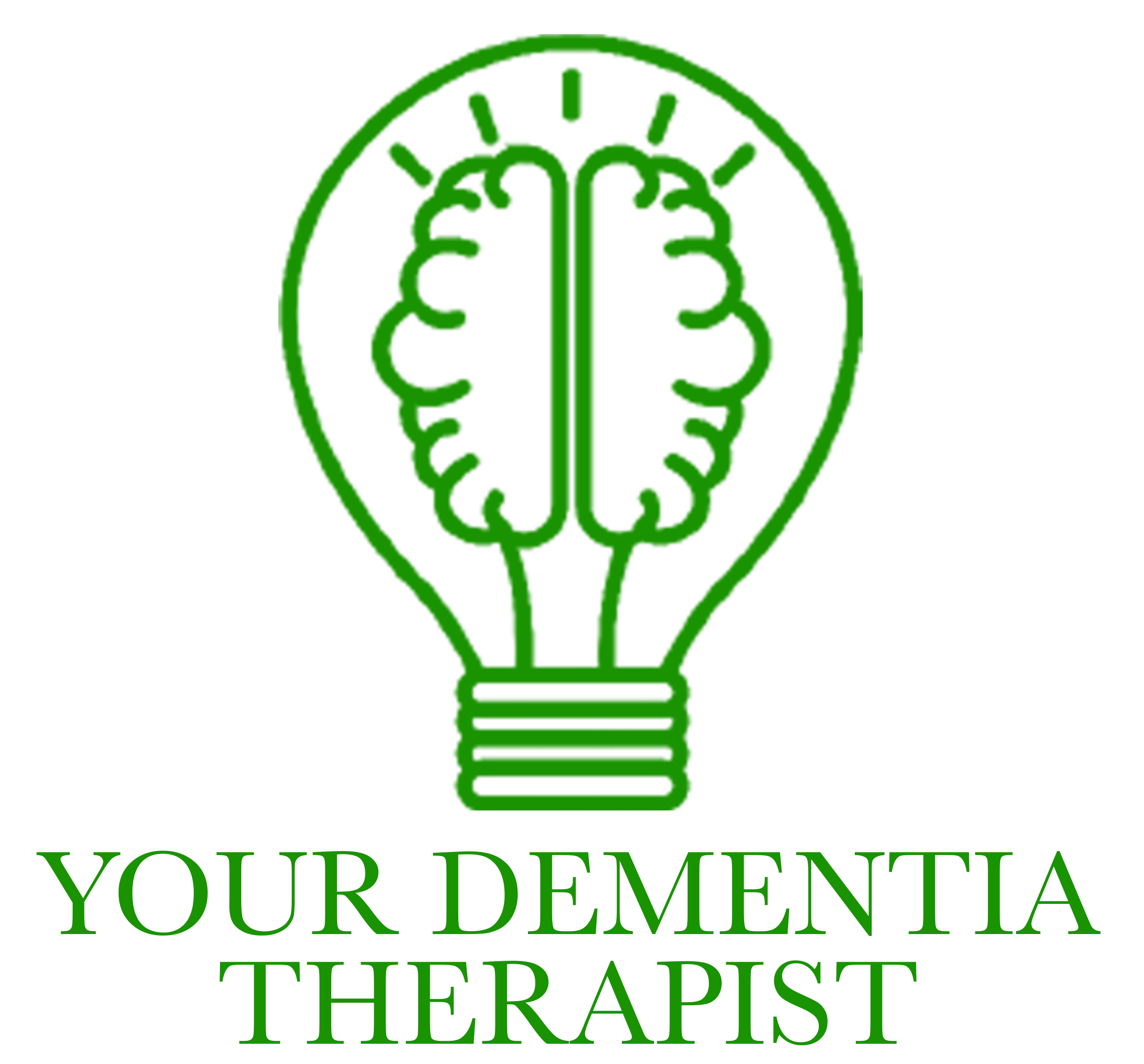For those who are taking care of a loved one who is living with dementia, setting dementia management goals may help improve you and your loved ones overall quality of life.
What is Dementia?

Dementia is a term used to describe the mental decline of an individual whose symptoms are problematic enough to interfere with day-to-day activities. Dementia is not a specific disease. It is a group of symptoms caused by other diseases that may affect thinking, memory, reasoning, personality, mood, and behavior.
Dementia develops when certain parts of the brain are affected by diseases and infections that occur in the parts of the brain that have to do with memory, decision-making, and language. Alzheimer’s disease is the most common cause of dementia.
Many other diseases cause dementia symptoms. Some of these include Vascular dementia disease, Lewy Body Disease, and Parkinson’s disease. While some may believe that dementia is a normal sign of aging, this is a misconception. Dementia is not a normal sign of aging.
Who Develops Dementia?
Dementia is referred to as a late-life disease that can develop in those individuals over the age of 65. It is estimated that 5-8% of individuals over 65 have some form of dementia. This percentage doubles every five years of age. By the time individuals turn 85 years old, there is a 50% chance of living with some form of dementia.
What are The Types of Dementia?
There are many different types of dementia. Some of the different types include:
- Alzheimer’s Disease
- Lewy Body Dementia
- Vascular Dementia
- Frontotemporal Dementia
- Huntington’s Disease
- Posterior Cortical Atrophy
- Creutzfeldt-Jakob Disease
- Parkinson’s Disease Dementia
- Normal Pressure Hydrocephalus
- HIV Associated Dementia
- Wernicke-Korsakoff Syndrome
- Mixed Dementia
What Causes Dementia?
Dementia is caused by damage to the brain. There are many different causes of dementia.
- Degenerative Neurological Disorders.
- Vascular disorders
- Infections
- Drug Use or Alcohol use
- Depression
- Build up of Fluid
What are The Symptoms of Dementia?
Dementia symptoms vary depending on the type of dementia. Symptoms may include:
- Memory impairment
- Asking questions multiple times. Not remembering
- Struggling to communicate with the correct word
- Confusion
- Struggle with money and numbers
- Anxiety
- Struggles carrying out tasks
- Quick mood changes
- Changes in behavior
- Changes in personality
- Trouble sleeping
Does Dementia Get Worse Over Time?
There are seven progressive stages of dementia. These are further broken down into early, middle, and late-stage dementia.
#1. Early Stage Dementia
In early-stage dementia, you should meet with your healthcare provider to develop a treatment plan and a support team. Meeting with an occupational therapist who specializes in dementia is an excellent option in this stage to help address areas of concern as well. If you reside in Texas, you can connect with me, Your Dementia Therapist, to help!
Common early-stage symptoms include
- Memory loss
- Confusion
- Struggling with Sense of direction
- Repeating yourself
- Difficulty with familiar tasks
- Struggles finding the right word in conversation
- Loss of Interest in favorite activities
- Confusion with places and times
- Mood changes
- Difficulties performing IADLs
#2. Middle Stage Dementia
In the middle stage dementia, symptoms increase as the disease progresses. Symptoms become more noticeable to those around you as the damage to the brain increases. In middle-stage dementia, day-to-day tasks become more difficult.
Common middle stage symptoms include:
- More noticeable memory and thinking problems.
- Speech problems.
- Struggles with the concept of times and days.
- Depressions and anxiety
- More delusions may be noted
- Hallucinations
- Requires assistance with ADLs
- Changes in appetite
- Balance and coordination impairments
- Changes in behavior
#3. Late Stage Dementia
Late-stage dementia is also known as advanced dementia or severe dementia. This stage is the shortest dementia stage lasting one to two years. This stage requires the most help from others to help with your needs. Late-stage dementia symptoms may include:
- Severe memory loss
- Difficulty communicating through speech
- Lose the ability to walk
- Eating and chewing become difficult
- Become Incontinent
- Sleep more
- Behavior changes
- More prone to infections and Pneumonia
- Normally require full assistance with ADLs in this stage
How is Dementia Diagnosed?
Receiving a dementia diagnosis may be difficult because many symptoms may be from other illnesses. It can be detected through a series of diagnostic testing, including medical history, review of symptoms, CT scans, cognitive tests, and labs tests. Consult your healthcare provider to give you a correct diagnosis.
Dementia Management
For dementia management, nonpharmacologic and pharmacologic intervention is usually recommended. This helps manage cognitive, behavioral, and psychological symptoms of dementia.
Is Dementia Treatable?
A common question many people ask is, “Is dementia treatable?” Before addressing this, it is important to know the difference between treatable, reversible, and treatable.
Almost all types of dementia are treatable. And it is through various medications and alternative treatments that help make symptoms more manageable.
Currently, there is no cure for dementia, nor is it reversible.
There are some dementia disorders that, when treated, can stop further damage.
These include:
- Side effects from drugs or alcohol
- Removal of tumors
- Removal of excess cerebrospinal fluid
- Correcting Vitamin B12 deficiency
- Correction of hypothyroidism
- Correction of hypoglycemia
- Depression
Dementia Management Goals

The purpose of the dementia management goals is to have regular appointments with your healthcare provider to monitor health, educate the individual living with dementia and the family, and get appropriate treatment to help manage symptoms.
Treatment goals also include:
- Maintain quality of life.
- Function as much as you can on your own in day-to-day activities.
- Enhance cognition, mood, and behavior.
- Provide a safe environment.
- Engage in social activities.
#1. Treating Cognitive Symptoms
Currently, there are 6 FDA-approved Alzheimer’s drugs that help treat symptoms of Alzheimer’s disease. These medications may help slow symptoms from becoming worse. The goal of these medications is to improve the quality of life in those currently living with cognitive symptoms caused by certain types of dementia.
#2. Treating Symptoms without medication
There are several dementia symptoms that can be treated without medication. Some of these include:
1. Occupational Therapy
Working with an occupational therapist is a perfect way to keep your loved one safe who is living with dementia. Occupational therapists help you keep your loved one safe by helping address safety issues,, providing tips on behavior management, and providing education on what to expect as dementia progresses. . If you reside in Texas, I would love to work with you to help you better care for your loved one.
2. Music Therapy
Listening to music can be therapeutic to those who are living with dementia.
3. Modifying the environment
You can do many modifications to your loved one’s environment living with dementia. Some of the treatments include:
- reducing clutter
- hiding things that may cause a safety threat
- and installing monitoring systems that alert you if your loved one begins to wander.
4. Simplifying Tasks
Help your loved one feel less frustrated by breaking tasks into smaller steps. Provide a structured routine that avoids undue confusion.
Other Things to do

When you are trying to do dementia management, lifestyle changes can be made to help your loved one manage symptoms.
#1. Communicate
When you talk with your loved one who is living with dementia, look them in their eyes. You will want to speak slowly with simple sentences. Use hand signals when possible to help them follow along.
#2. Exercise
Encourage your loved one who is living with dementia to exercise. Evidence shows that when you exercise, it helps protect your brain. This also helps with balance, improves strength, and with cardiovascular health.
#3. Be Active
Plan activities that your loved one likes to do that they are still able to participate in. This can include gardening, yoga, cooking, painting, and many other activities. Do these activities with them or find a group that they can go to and socialize as they do an activity they enjoy.
#4. Nighttime Routine
Establish a nighttime routine. Often, those who are living with dementia struggle more at nighttime. Creating a routine at night can help them know what to expect to help them manage behavioral symptoms.
#5. Post a Calendar
Post a calendar with important events and appointments on the wall. This allows your loved one who is living with dementia to know what is coming up and will enable them to feel some independence.
#6. Plan
Plan early for the future. Ensure all documentation and paperwork is done and know their future wishes when their dimension symptoms progress.
Dementia Management: Tips for Daily Tasks
Helping those who are living with dementia takes patience. So, to help with this frustration, it is important to set dementia management goals.
Reducing Frustration
Individuals who are living with dementia will become more frustrated because they can no longer do what they once did. These tips can help manage dementia.
#1. Stick to a schedule
It is important to stick to a daily schedule. This allows your loved one to know what to expect without being thrown off with sudden changes.
For those who are living with dementia, different times of the day are much worse than others. Set appointments when they are most alert and refreshed.
#2. Take your time
Understand that things will take longer. While it is probably easier to do things for your loved one, allow them the chance and time to do it without making them feel rushed.
#3. Involve your loved one
If your loved one can set the table, allow them to help. Give them tasks to feel included if it is safe to do so. As you involve them in decisions, they feel less of a burden to you as they help with simple tasks.
#4. Give them choices
Your loved one who is living with dementia would like to make choices. Ask them if they would like Sprite or Root Beer with their lunch or let them choose between two shows. Allow them to make choices, but not too many options.
#5. Provide Simple Instructions
Those who are living with dementia need simple one-step communication. They become less frustrated trying to remember all the steps as you do this.
#6. Limit Naps
Try to limit the number naps, especially later in the day. This may help with a better night’s sleep.
#7. Limit Distractions
Limit the distractions that are around your loved one living with dementia. Turn off the TV when eating or when conversing.
#8. Be flexible
As dementia progresses, they will become more dependent on you for assistance. To reduce frustration, understand that you will need to be flexible. If your loved one wants to wear the same outfit every day, perhaps buy several of this same outfit.
#9. Focus on Individualized Care
When setting dementia management goals, it is important to focus on your loved one. Individuals who are living with dementia will all have different symptoms and progress differently. It is important to focus on your family members and give the best care possible.
Try to remain patient and flexible in order to offer the best support for your loved ones overall care.
References
- https://my.clevelandclinic.org/health/diseases/9170-dementia
- https://www.alz.org/professionals/health-systems-clinicians/management
- https://medlineplus.gov/ency/article/007428.htm
- https://www.mayoclinic.org/healthy-lifestyle/caregivers/in-depth/alzheimers-caregiver/art-20047577
- https://www.alz.org/help-support/caregiving/care-options/in-home-care
- https://homecareassistance.com/blog/dementia-how-to-care-for-a-parent-at-home
- https://www.aplaceformom.com/caregiver-resources/articles/dementia-care-at-home
- https://www.mayoclinic.org/diseases-conditions/dementia/diagnosis-treatment/drc-20352019



